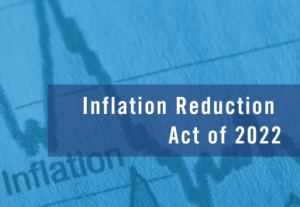Inflation Reduction Act of 2022

President Biden signed the Inflation Reduction Act of 2022 (“IRA”) into law on August 16, 2022. The IRA is a skinny version of the Build Back Better Act, which was passed by the House but failed to pass in the Senate last fall. The 273-page IRA addresses climate, energy, healthcare, taxes, and IRS funding. In this article, we are only covering a few areas that might affect our clients. We are also including a links to several articles that cover additional provisions.
IRS Appropriations
Under the IRA, the IRS will receive $80 billion in additional funding over the next nine years. Most of the funds are directed towards enforcement, but other areas will receive funding as follows:
- Enforcement $45.6 Billion
- Operations $25.33 Billion
- Business Systems Modernization $4.75 Billion
- Taxpayer Services $3.18 Billion
Any tax practitioner will agree that the IRS needs to improve taxpayer services and modernization. The number of misapplied payments and erroneous notices has increased dramatically since Covid. It has become very difficult to resolve taxpayer issues, whether by phone or mail.
The Treasury Department expects to hire 87,000 additional IRS agents over the next decade, while 50,000 agents are expected to retire.
On August 10, Treasury Secretary Yellen wrote a letter to Commissioner Charles Rettig that supports the funding and promises the increased IRS audit efforts will focus on high-income taxpayers and businesses, as opposed to individuals earning $400,000 per year or less. A link to this letter is included below.
Clean Vehicle Energy Credits
The IRA provides up to a $4,000 credit for the purchase of a used clean vehicle and up to $7,500 credit for a new clean vehicle. The credits are available for taxpayers with AGI less than $300,000 (married filing jointly) or $150,000 (single). The IRA also removes the 200,000 electric vehicle cap on manufacturers.
Before you buy an electric vehicle, make certain you and the vehicle qualify for the credit. There are additional restrictions – only electric vehicles made (final assembly) in North America qualify. Battery materials and minerals also have manufacturing and sourcing restrictions.
Energy Efficient Home Improvement Credit
The IRA extends the nonbusiness efficiency credit until 2033. The credit is increased from 10% to 30% of the cost of eligible energy-efficient improvements and property expenditures. The maximum credit is now $1,200 per year instead of $600 per lifetime. We typically see clients taking advantage of this credit when making energy-efficient improvements or replacing water heaters or HVAC units.
Caution – before making an improvement, make sure the improvement or replacement qualifies for the credit. The tax code specifies minimum efficiency ratings and other requirements.
We’ll continue to dig into the details of the IRA and keep you informed of further developments as additional information becomes available. Below are links to a few articles if you’d like additional information. Please call your Dent Moses advisor if you have questions.
https://www.forbes.com/advisor/personal-finance/inflation-reduction-act/
https://budgetmodel.wharton.upenn.edu/issues/2022/8/12/senate-passed-inflation-reduction-act